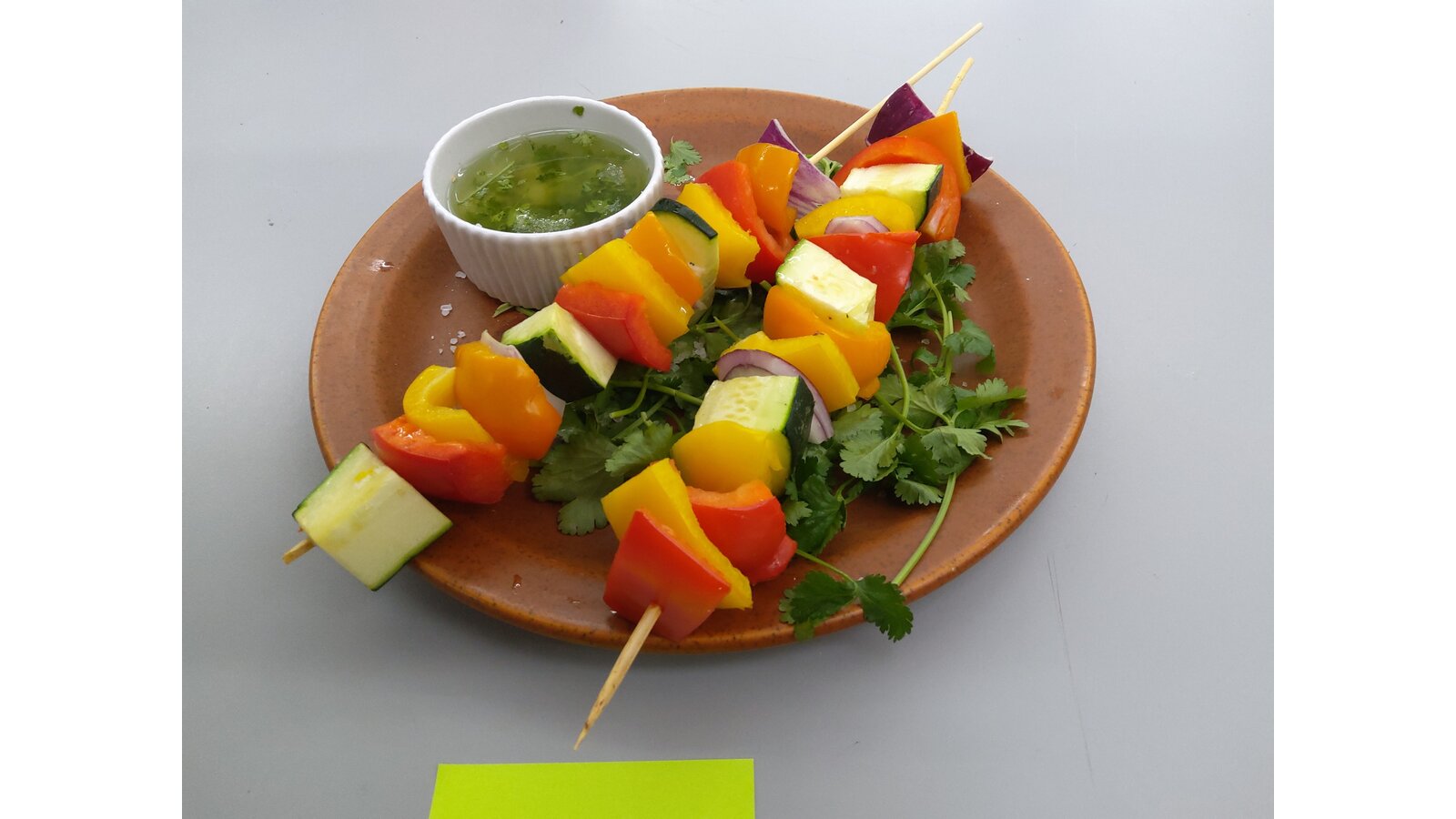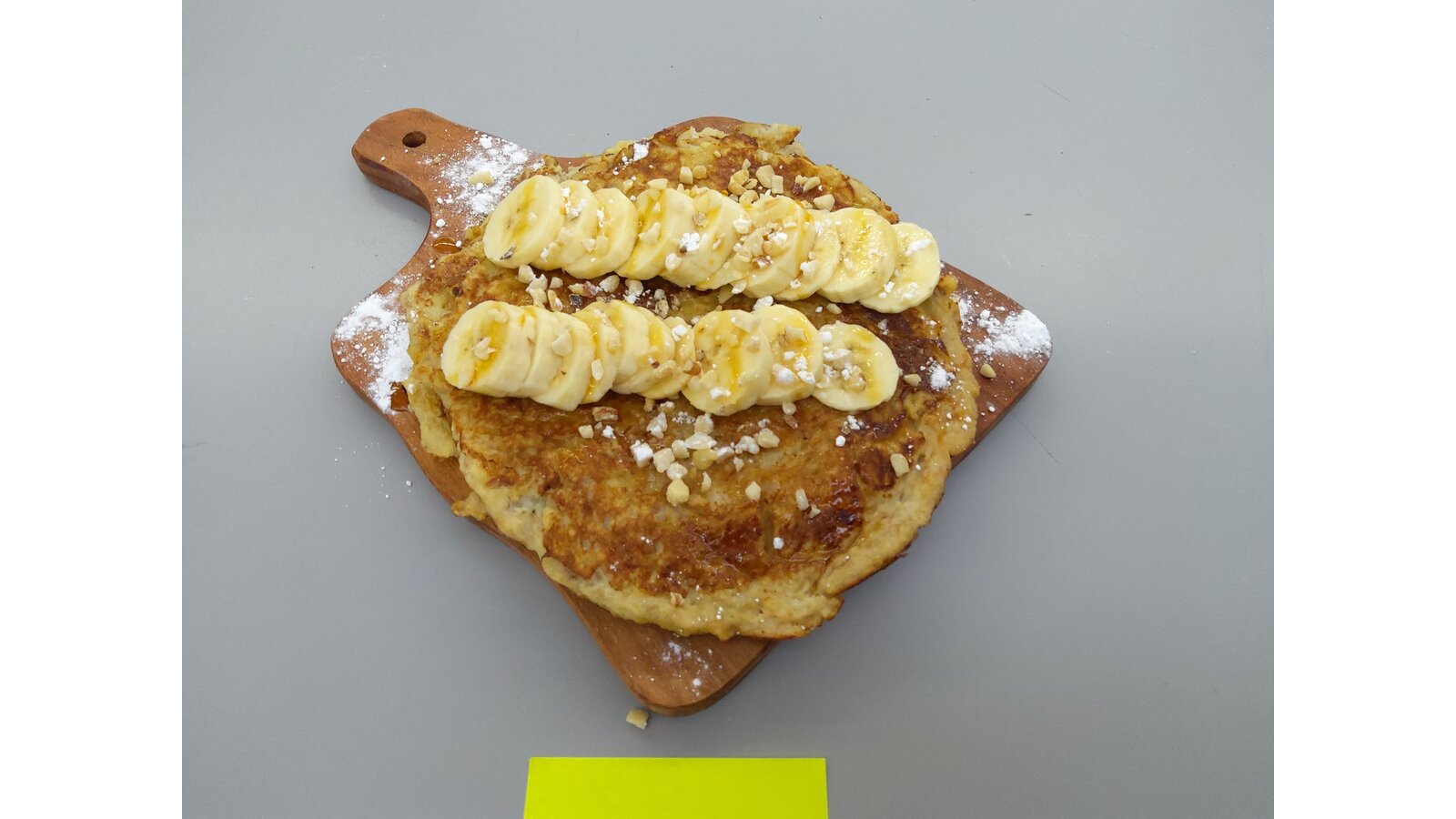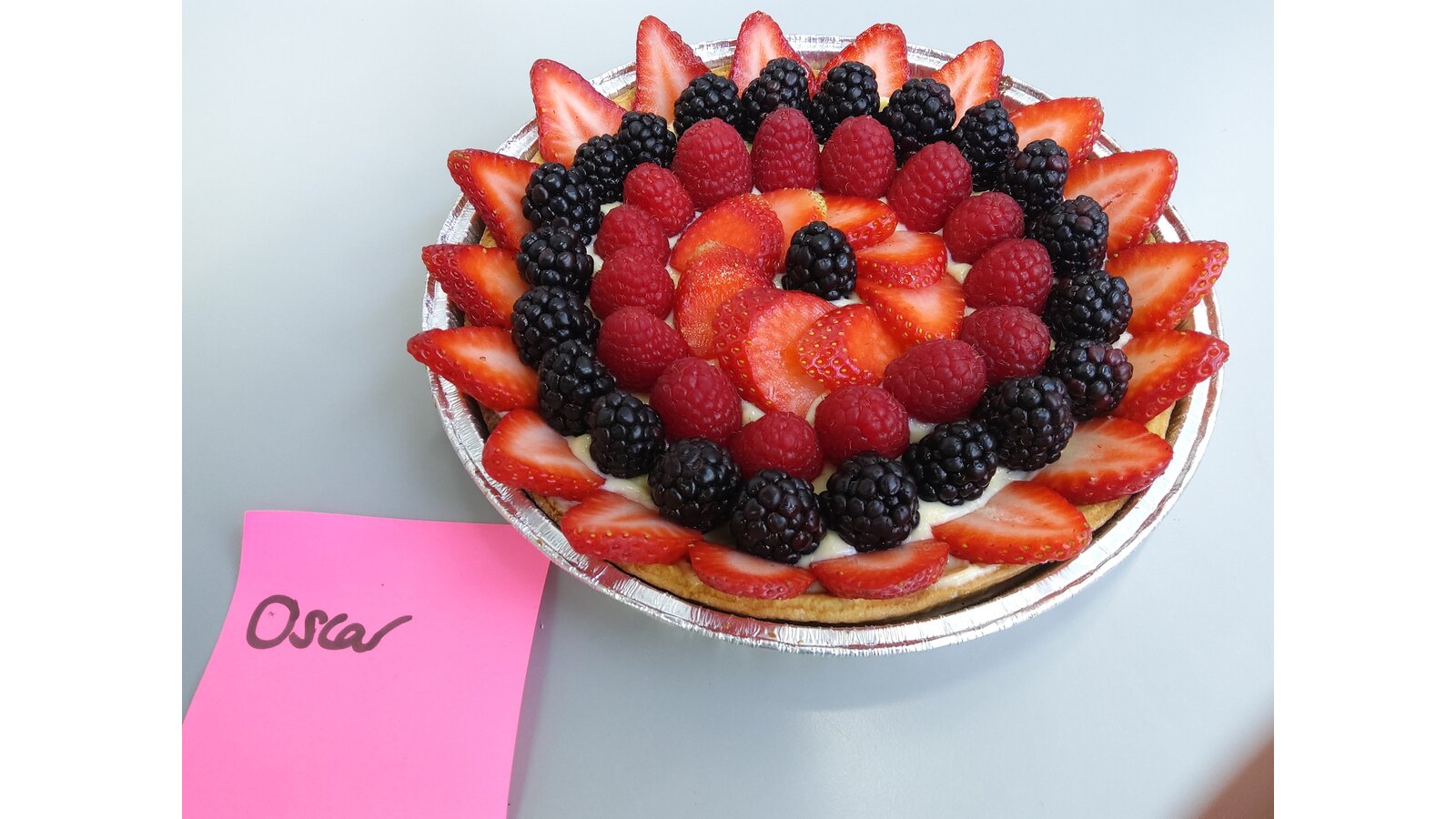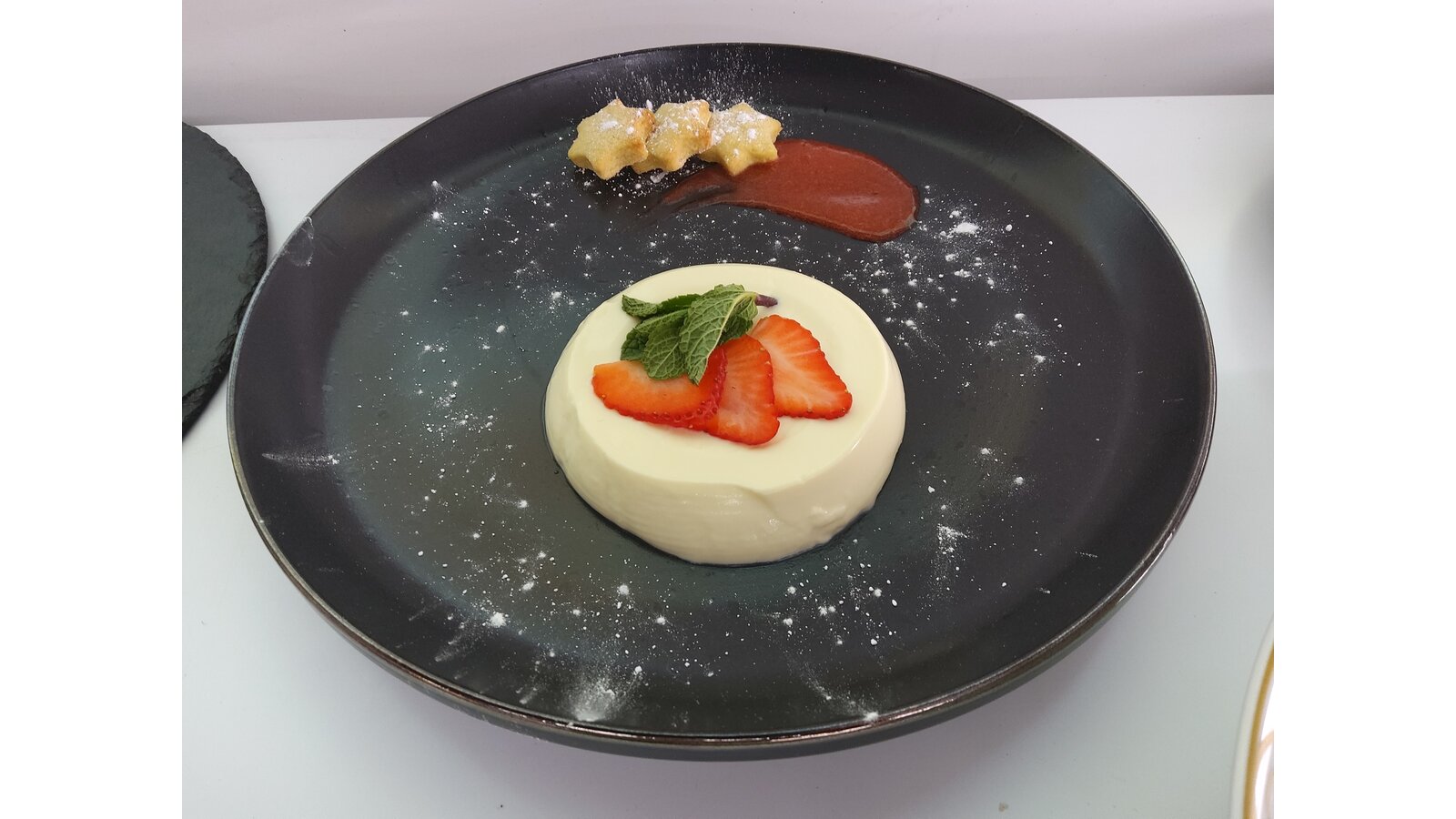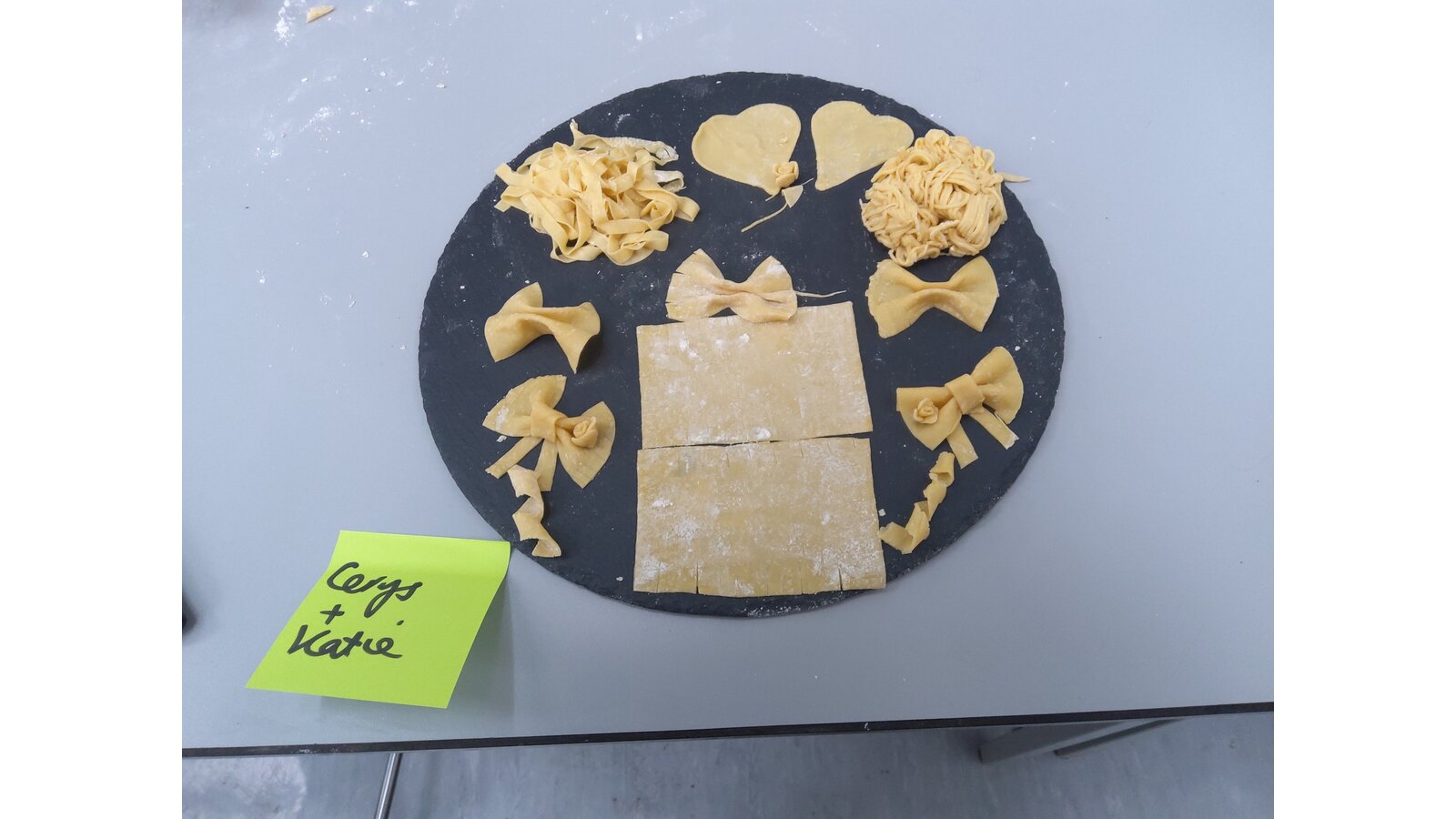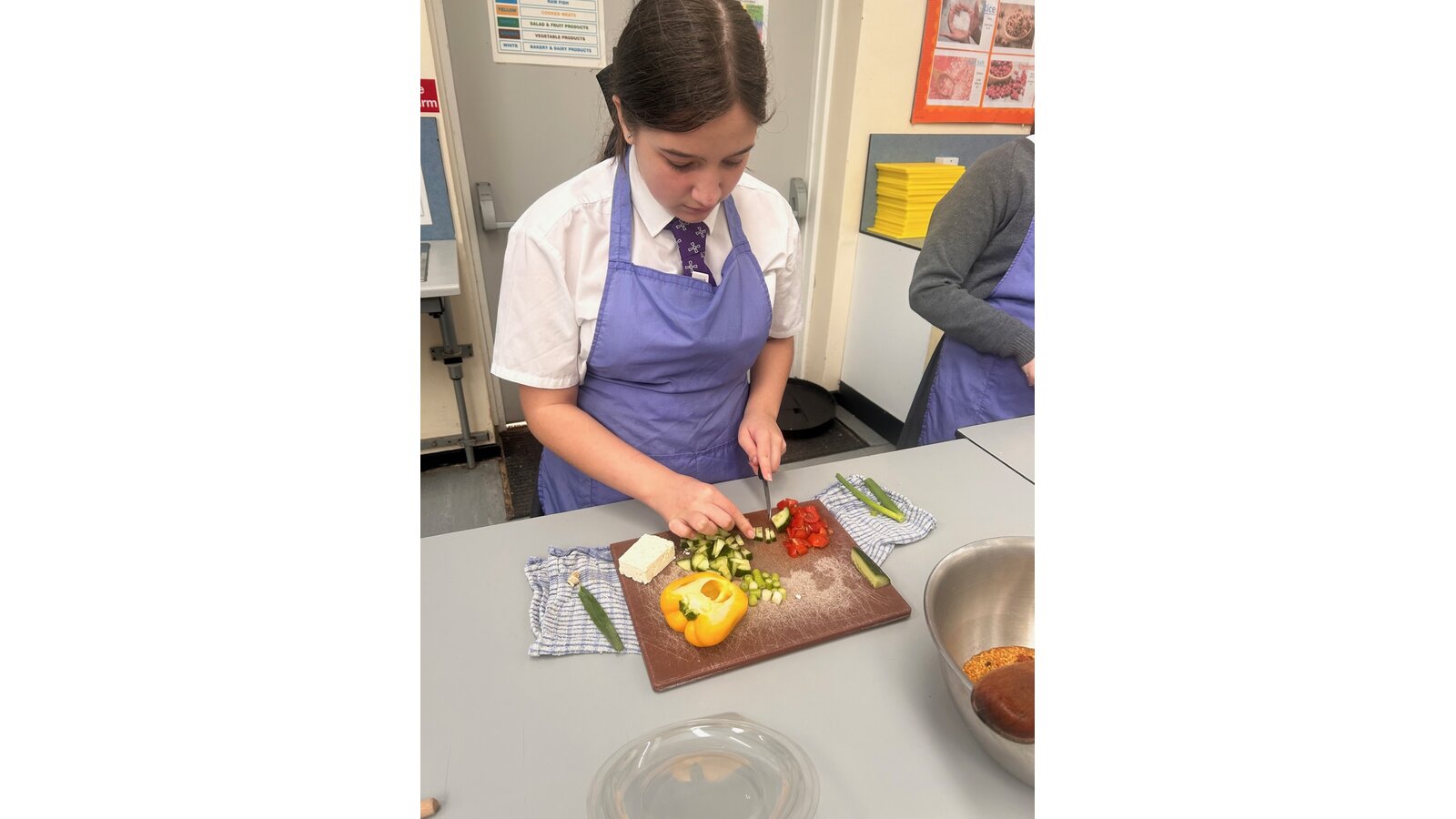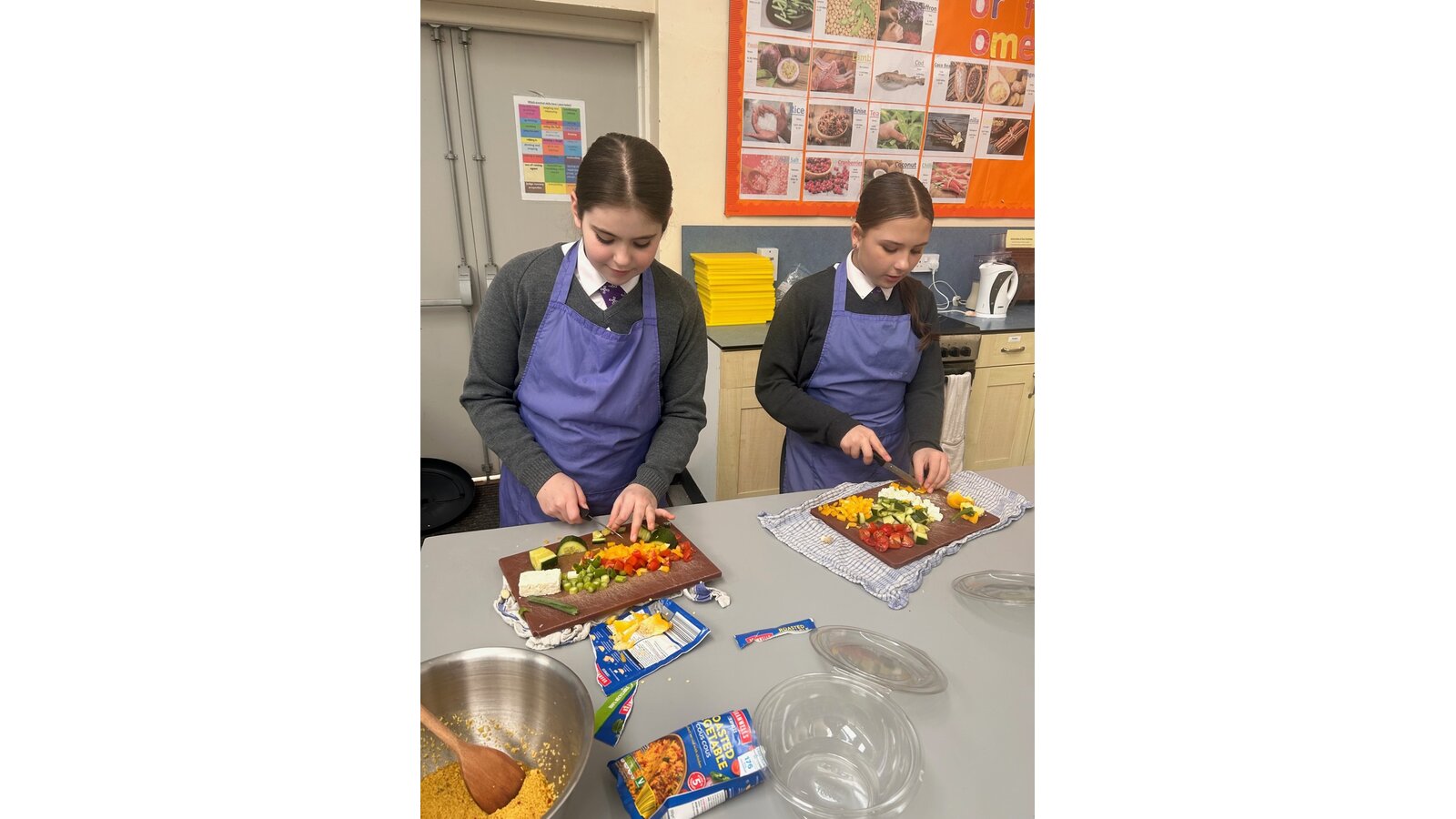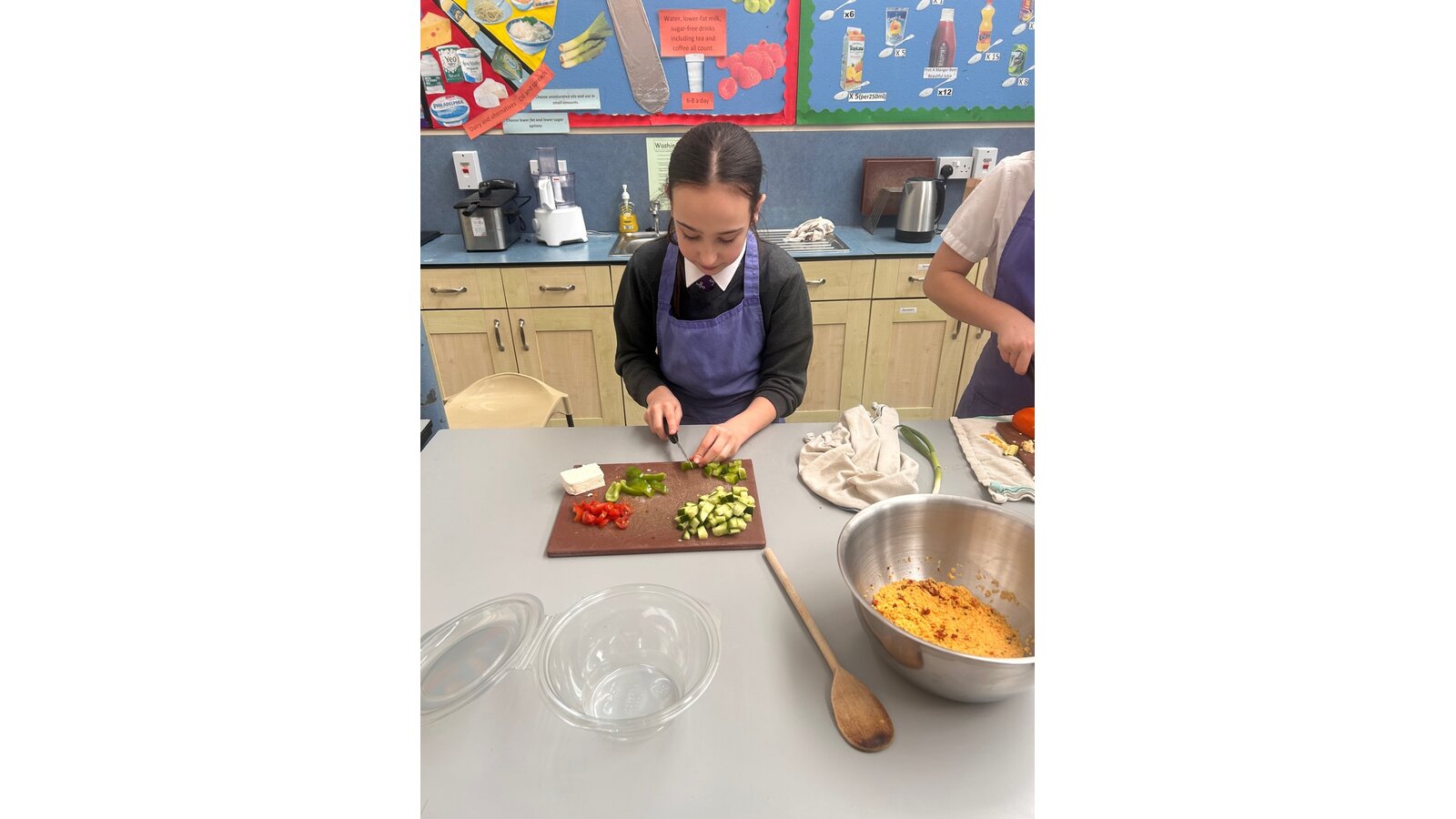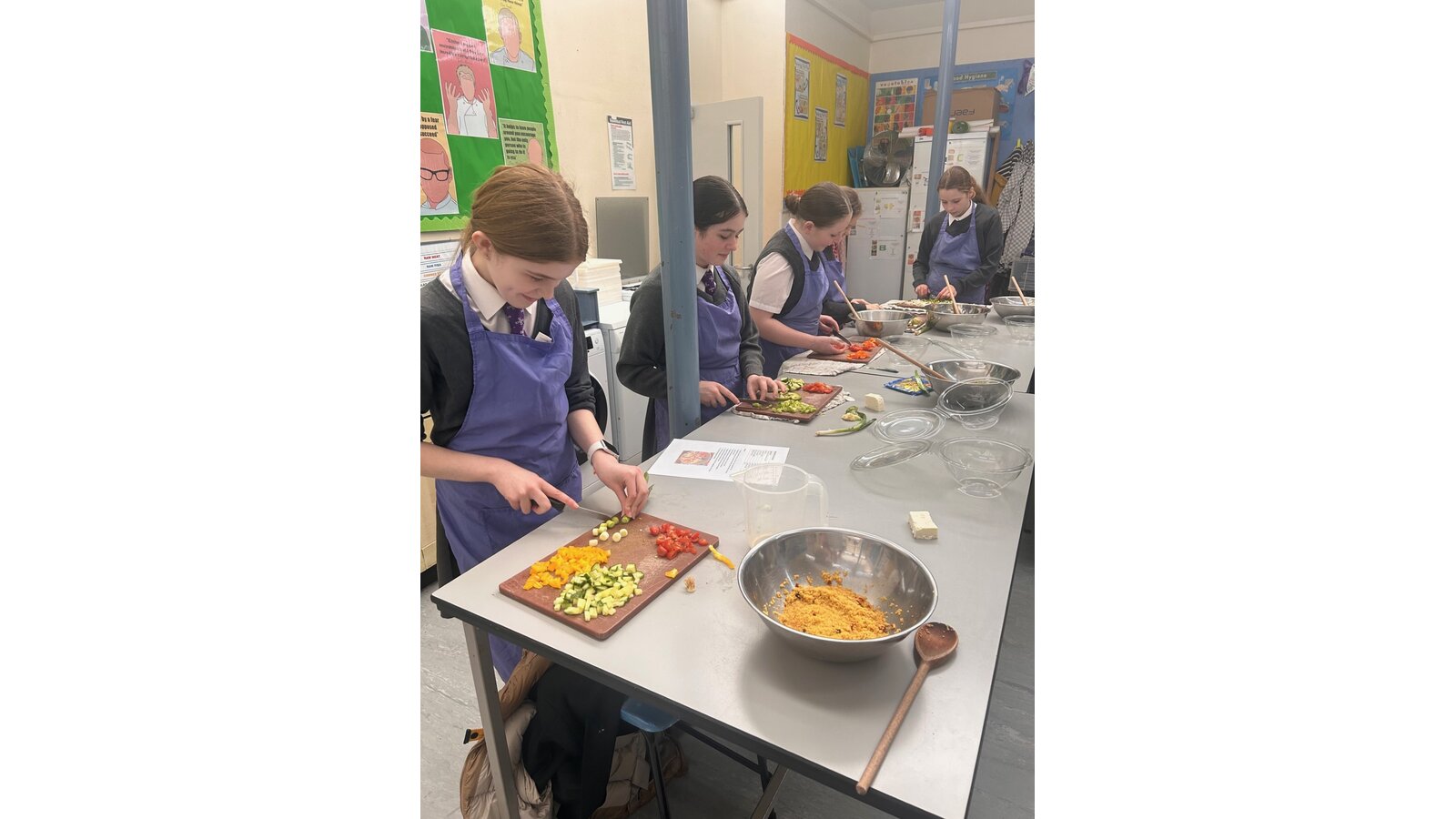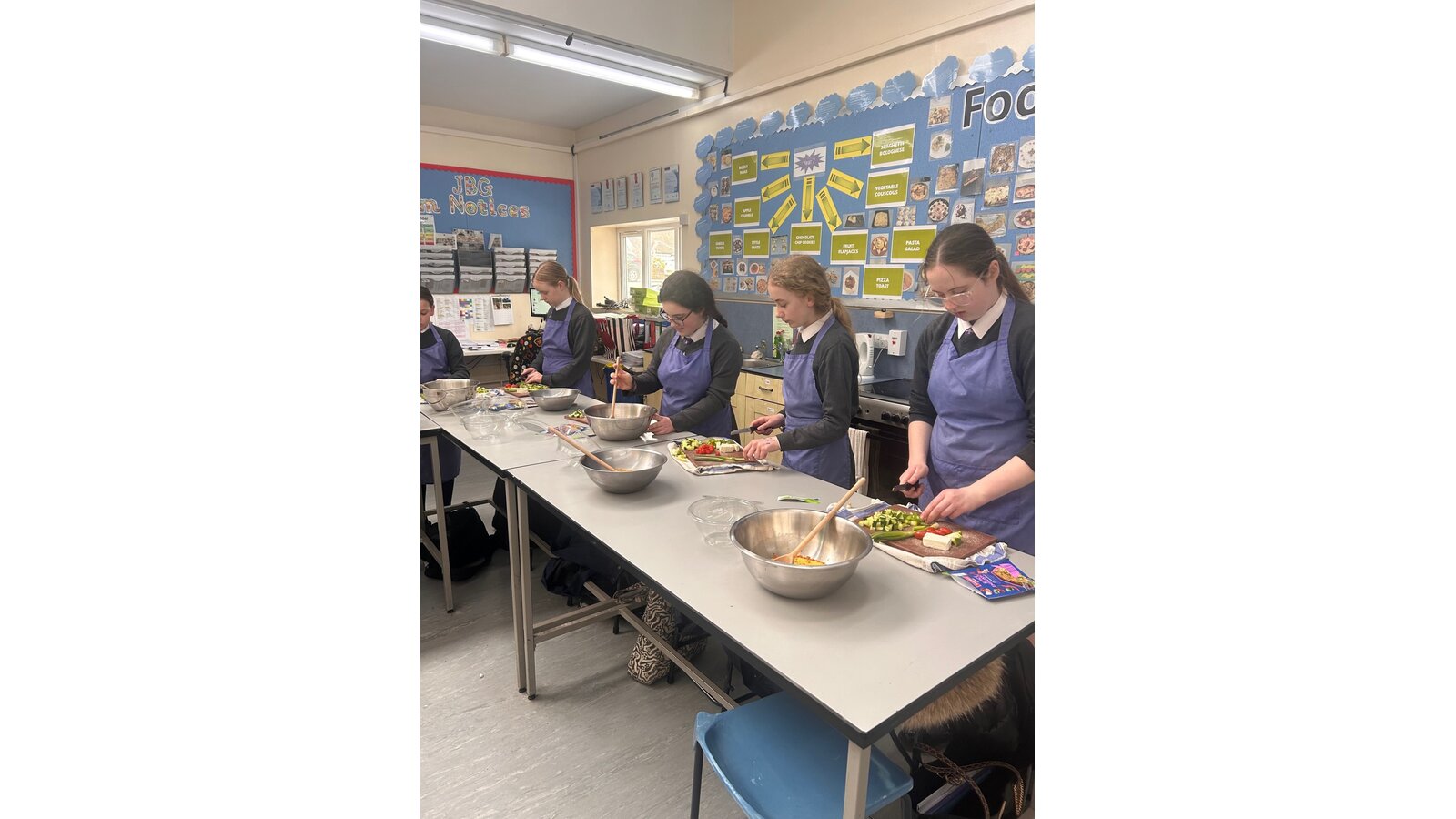Food Technology
Head of Department - Miss J. Bocking
Overview
This is a subject which combines creativity and skills to develop confident, healthy and independent individuals. Pupils will be inspired to learn the invaluable life skills of cooking and the enjoyment and challenge of creating a wide variety of tasty dishes for themselves and others.
Following the national curriculum for Food, the focus is on learning a wide variety of cooking skills whilst working safely and hygienically. The dishes selected to cook in practical lessons are chosen carefully to practice specific skills, whilst being mindful of cost, dietary requirements and lesson time. Pupils are encouraged to adapt the basic recipes through discussion with the teacher and creativity is actively encouraged. As part of our assessment, students will regularly get an opportunity to select their own dishes to cook and further develop their skills.
This subject is totally inclusive and provides an opportunity for all pupils to achieve. Our curriculum will enable pupils to make informed decisions about a wide range of further learning opportunities and career pathways as well as develop vital life skills that enable them to feed themselves and others affordably and nutritiously, now and later in life.
Key Aims
Pupils will…
- Demonstrate effective, safe and hygienic cooking skills by planning, preparing and cooking using a variety of food commodities, techniques and equipment.
- Develop knowledge and understanding of the functional properties and chemical processes involved in working with food.
- Be apply to apply key healthy eating principles and understand the relationship between diet, nutrition and health, including the effects of poor diet and health.
- Understand the economic, environmental, ethical, and socio-cultural influences on food availability, production processes, and diet and health choices
- Demonstrate knowledge and understanding of functional and nutritional properties, sensory qualities and microbiological food safety considerations when preparing, processing, storing, cooking and serving food
- Understand and explore a range of ingredients and processes from different culinary traditions (traditional British and international), to inspire new ideas or modify existing recipes.
The Food curriculum has been planned so that it is fully inclusive and allows pupils to succeed at any ability level. We aim to ensure that all pupils, including the high ability and those with SEND are able to access and succeed in Food.
The specific needs of SEND pupils are communicated by the SENDCO and through Provision Map SEND plans. Teacher also have reading age data and KS3 literacy targets. This information allows the Food teacher to adapt the curriculum so that it can be accessed by all. For example, we offer the flexibility to offer different qualifications at KS4 depending on the cohort of pupils.
At KS3 we support students by planning structured and chunked activities which engage all pupils. Pupils are specifically grouped and seated to maximise participation. One to one, TA and peer support is used where appropriate. Visual support materials are used and expectations are modelled to ensure all pupils understand what a successful outcome looks like. We aim to build pupil confidence and celebrate success, tasks are specifically design to allow all pupils to succeed at their own ability level. Our efforts at KS3 mean that our subject is a very popular choice at KS4 for students of all abilities.
Our options process is open to all. This means that in Food we cater to a full range of abilities. We adapt the curriculum to meet these needs by selecting a suitable qualification and this can change from year to year, depending on the cohort. Both GCSE Food Preparation and Nutrition and Level 1/2 Vocational Award in Hospitality and Catering both offer controlled assessment tasks which can be adapted to suit the needs of all ability levels. Also the 'ramped' nature of the exam papers and variety of question styles and command words ensure accessibility to students of all ability levels.
In Food, we support the whole-school priority to improve the literacy of all students by creating opportunities for pupils to read subject specific material in lessons, teacher modelling and scaffolding answers to written questions, increased … (explain how literacy is planned into your curriculum). This can be seen in our curriculum planning and in the way we are introducing the key elements of reciprocal reading into our lessons, for example, asking pupils to predict an outcome of a food science experiment, question the teacher or other pupils to better understand a topic, clarify written information (e.g. a recipe) by decoding words and analysing how parts of it link together and summarise the points of a text (e.g. the main skills needed in a recipe).
Key Stage 3
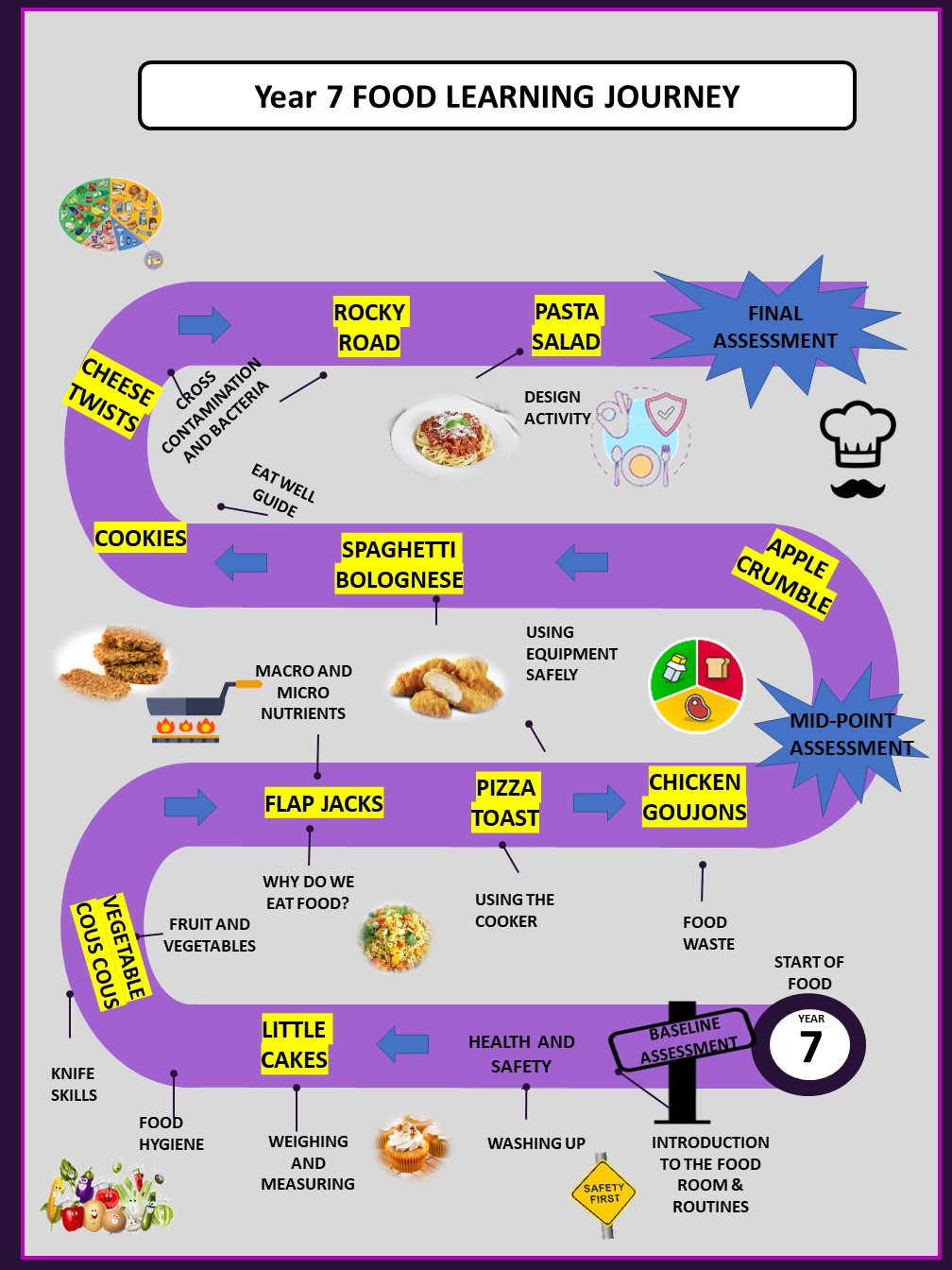
Developing Basic Skills in Year 7
Students will develop primarily their knowledge of food safety and hygiene, equipment, building upon knowledge gained at Key Stage 2. This will be alongside the development of basic practical skills involving through taking part in a number of practical activities. The aim of the course is to provide students with many opportunities to build up their confidence, knowledge and skills to enable them to produce good quality food products.
Students will be formally assessed twice per unit with a written test and a practical assessment. There is an emphasis on practical skills and recipes are selected to promote healthy eating and a balanced diet.
Practical work includes: small cakes, vegetable couscous, fruity flapjack, pizza toast, apple crumble, spaghetti Bolognese, rocky road, cheese twists, pasta salad, chicken goujons, chocolate chip cookies.
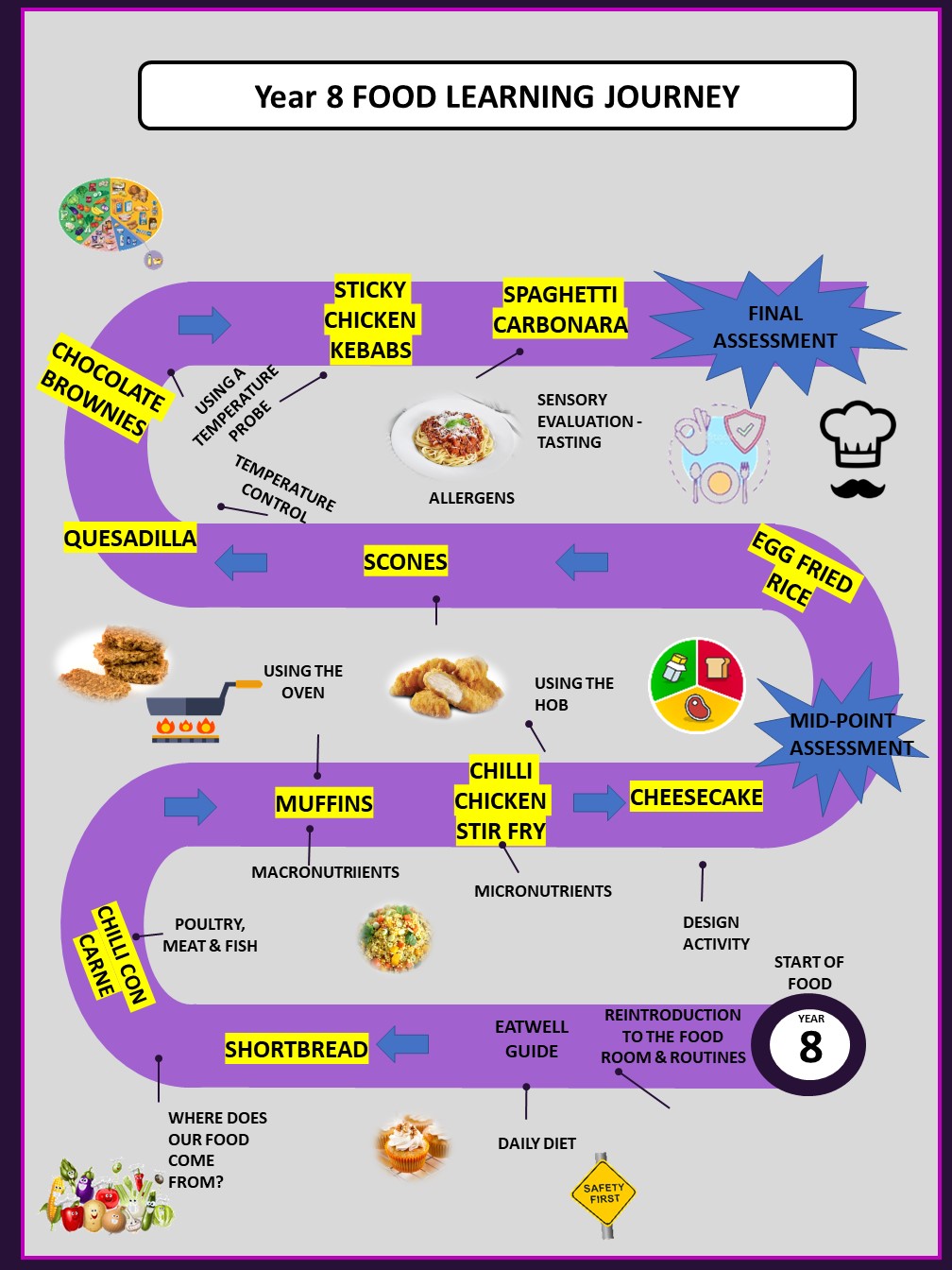
Year 8 - Healthy Eating and the Eat Well Guide
The emphasis will be on creating balanced meals for a teenager. The students will focus their research on the importance of the Eat Well Guide and the nutrients required for a healthy and balanced diet. We also look at food provenance and seasonality. Practical skills will be developed and improved using a variety of equipment and cooking methods.
Students will be formally assessed twice per unit with a written test and a practical assessment. There is an emphasis on developing practical skills and recipes are selected to promote healthy eating and a balanced diet whilst using a range of different ingredients.
Practical work includes: shortbread, chilli con carne, chocolate brownie, chilli chicken stir fry, cheesecake, quesadilla, muffins, tuna pasta bake, scones, egg fried rice, sticky chicken kebabs.
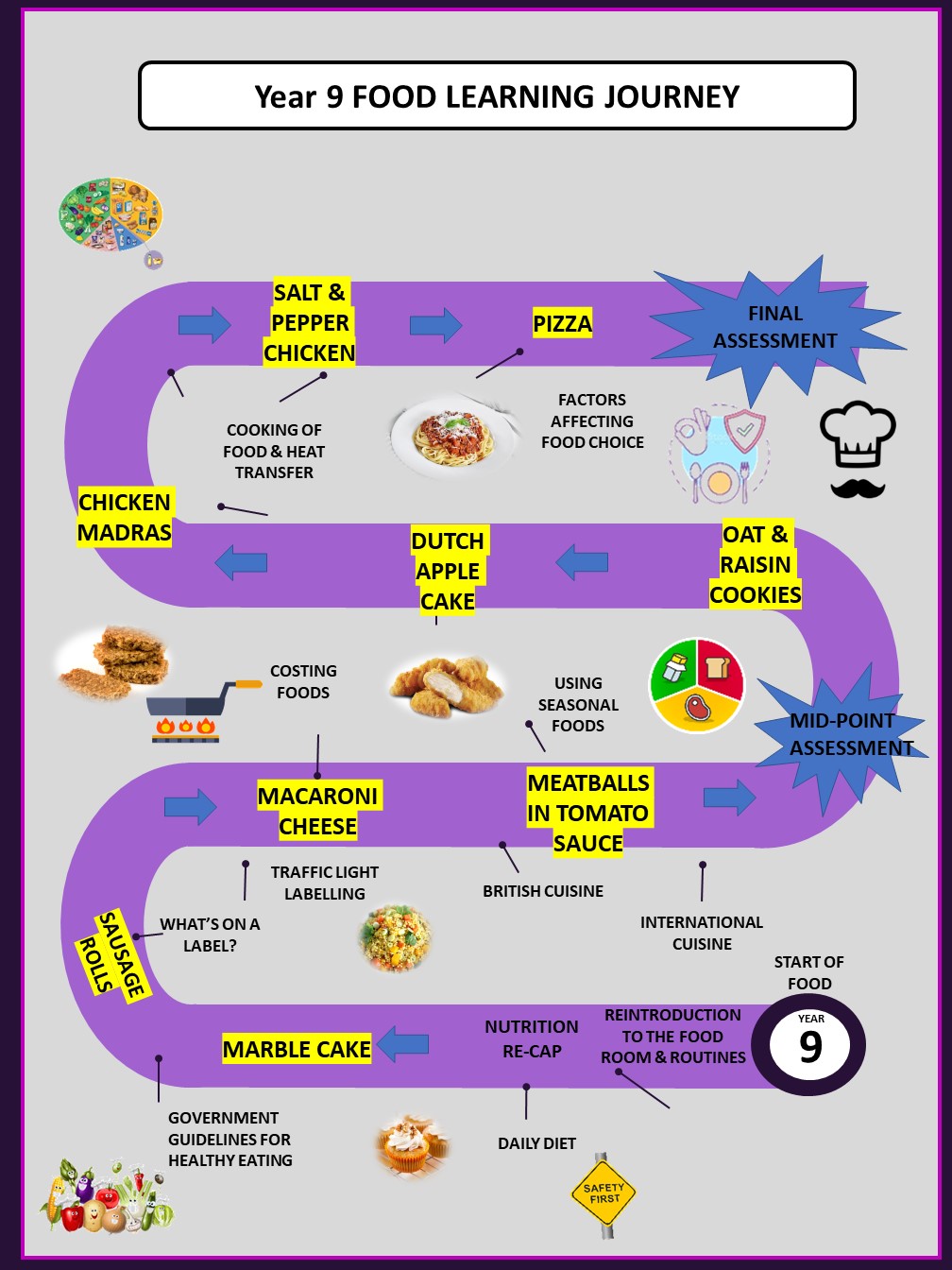
Year 9 – Food in the Wider World
Students will continue to develop and improve their practical skills through a range of more advanced recipes. We will be looking at British cuisine and cuisines from around the world. There is a continued emphasis on nutrition and we look at the government guidelines for healthy eating.
Students will be formally assessed twice per unit with a written test and a practical assessment. There is an emphasis on practical skills and recipes are selected to promote enjoyment of food as well as healthy eating and independent cooking skills.
Practical work includes: marble cake, sausage rolls, macaroni cheese, meatballs in tomato sauce, oat and raisin cookies, Dutch apple cake, chicken madras, salt and pepper chicken, pizza.
Food Technology Key Stage 3 Curriculum Maps
Key Stage 4
Students are able to continue building upon their knowledge and skills developed a Key Stage 3 by opting for this subject into Key Stage 4. Currently, pupils are studying GCSE Food Preparation and Nutrition (EDUQAS exam board). This qualification will equip students with the knowledge, understanding, skills and encouragement they need to cook. It will give them the ability to apply the principles of food science, nutrition and healthy eating. Students will be able to make informed decisions about a wide range of further learning opportunities and career pathways and develop vital life skills so that they can feed themselves and others affordably and nutritiously.
GCSE Food Preparation and Nutrition (EDUQAS exam board) will equip students with the knowledge, understanding, skills and encouragement they need to cook. It will give them the ability to apply the principles of food science, nutrition and healthy eating. Students will be able to make informed decisions about a wide range of further learning opportunities and career pathways, and develop vital life skills so that they can feed themselves and others affordably and nutritiously.
Students will study food commodities are studied in greater depth and experiment with ingredients and advanced cooking techniques. Assessment is a combination of written examination and Controlled Assessment which includes practical cooking, research and experimental work. In addition, the students will learn about the world in which they live, understand modern food production and processing methods, consumerism and dietary changes and challenges.
The GCSE is split into 2 parts; Non-exam assessment (NEA) 50%, and Paper 1 (exam 1hr 45 minutes) 50%. The NEA comprises of 2 tasks; A food investigation and assesses students' understanding of the working characteristics, functional and chemical properties of ingredients. A food preparation assignment that assesses students' knowledge, skills and understanding in relation to the planning, preparation, cooking, presentation of food and application of nutrition related to the chosen task. Students will prepare, cook and present a final menu of three dishes within a single period of no more than three hours, planning in advance how this will be achieved. Paper 1 assesses students theoretical knowledge of food preparation and nutrition from the following areas; Food nutrition & health, food science, food safety, food choice and food provenance.
KS4 GCSE Food Preparation & Nutrition Curriculum Map
|
Year 10 |
Autumn 1 Sept-Oct |
Autumn 2 Oct-Dec |
Spring 1 Jan-Feb |
Spring 2 Feb-March |
Summer 1 March-May |
Summer 2 May-July |
|
Practical skills (I will do):
|
Selecting a range of fruit and vegetables, herbs & spices and using potatoes to create a dish.
Demonstrating a range of knife skills including claw grip, bridge hold, julienne, baton, dicing. Also peeling, grating, piping potato.
Building on key skills including use of hob, oven blender, rubbing in method, roux sauce, weighing & measuring etc.
|
Making and shaping pasta by hand and using a pasta machine. Successfully cooking a range of rice and pasta dishes.
Building on key skills including knife skills, using the food processer, boiling, testing for readiness and food styling/presentation. |
Making different types of bread including unleavened flat breads and pizza.
Baking cakes using the whisking, rubbing-in, melting and all-in-one methods.
Demonstrating skills including lining tins, kneading, proving and shaping bread dough.
Building on key skills including using raising agents, weighing and measuring accurately, using the oven, testing for readiness. |
Making puff, short crust and choux pastry.
Developing use of dairy in recipes to make a variety of dishes.
Demonstrating skills including baking blind, rolling out, cutting and shaping pastry. Also, setting a mixture.
Building on key skills including using the oven and hob, knife skills and testing for readiness. |
Cooking with protein - meat, poultry & fish including stuffing, breaded, burgers, using sauces and stir fry techniques.
Demonstrating a range of skills including knife skills, portioning and deboning chicken, handling and cooking raw meat, tenderising, marinating and key safety points.
Building on key skills including using the hob, oven, knife skills, use of food processor. |
Cooking with eggs and using eggs to make meringues, custard and mayonnaise.
Learning about how to cook with protein alternatives like tofu.
Demonstrating skills including whisking egg white mixture, testing for readiness, portioning and food styling.
Building on key skills including using electric whisk, using the food processor, using the oven and hob, weighing and measuring. |
|
Practical assessment |
Cooking and presenting your own dish based on fruit/vegetables |
Cooking and presenting your own pasta or rice dish |
Bake Off - sponge layered cake |
Cooking and presenting your own pastry creation. |
Cooking and presenting your own dish made with meat, poultry or fish dish |
Cooking and presenting your own protein-based dish. |
|
Essential Knowledge (I will know): |
Detailed knowledge of hygiene, safety and kitchen routines.
Seasonal foods. Food provenance. Five-a-day imitative. Eatwell guide. Benefits of eating fruit/vegetables. Types of potatoes and uses. Herbs and spices Enzymic browning.
Food provenance & food waste/ impact/ways to reduce
Food safety and safe storage of food.
Cross contamination, food poisoning.
|
Pasta making, varieties of pasta.
Cereal crops – growing/harvesting. Primary & secondary processing of cereal crops including rice, maize, corn, oats, barley, rye.
Identification and role of nutrients – macronutrients/ micronutrients
Dietary fibre/water.
Diet and good health, dietary guidelines
Benefits of a healthy diet.
|
Bread products Nutritional value of bread.
Chorleywood process.
Key ingredients & functions in bread making.
Cake making methods.
Diet and lifestyle Special diets – coeliac, diabetes etc. Factors affecting nutritional requirements
|
Pastry making methods – ingredients, techniques and products.
Dairy foods Milk processing Nutritional value of dairy foods. Alternatives to cow’s milk. Types of cheese, making process and uses. Yoghurt/cream.
Cultures & cuisines to include knowledge of foods/recipes from at least two international countries. |
Types of meat and poultry.
Farming and traceability. RSPCA/Red Tractor labels.
Nutritional value of meat/poultry.
Methods of cooking meat & poultry.
Classification/types of fish. What to look for when buying fresh fish. Fish & sustainability Nutritional value of fish. Filleting fish Methods of cooking fish.
Environmental issues – food miles/carbon footprint/sustainability.
Ethical food choices – organic, GM etc.
|
Types of egg farming Eggs – sizes, assurance schemes, labelling quality, structure.
Nutritional value of eggs. Use of eggs in recipes and dishes. Function of eggs in cooking. Storing eggs and egg freshness
Beans, pulses, nuts & seeds – types, uses & nutritional value. Nut allergies.
Alternative protein foods – types, uses and nutritional value including Quorn, tofu etc.
|
|
Knowledge will be assessed with an End of unit written test.
|
||||||
|
Recipes |
Carrot and coriander soup with croutons. Apple and pear crumble. Guacamole. Cauliflower cheese with roux sauce. Potato gratin. Hasselback potatoes. Potato rosti. Duchess potatoes. |
Making fresh pasta – tagliatelle/spaghetti/pasta shapes. Pesto pasta. Classic tomato spaghetti. Ravioli.
Risotto. Rice & peas. Arancini.
|
Flat breads and garlic butter. Focaccia. Braided bread. Pizza.
Swiss roll. (whisking method) Savoury scones (rubbing in method) Gingerbread (melting method) Victoria sandwich cake (all in one method) |
Quiche (shortcrust pastry) Sausage/cheese & onion rolls (rough puff pastry) Profiteroles/eclairs (choux pastry) Samosas/spring rolls (filo pastry)
Panna Cotta Chocolate mousse
|
Portioning whole chicken. Chicken Kiev (chicken breasts) Sticky chicken wings & drumsticks Chicken curry (thighs) Wrapped & stuffed chicken breast.
Lemon & thyme pork schnitzel Pork & apple burgers Teriyaki beef with noodles Fishcakes |
Scotch eggs Custard Mayonnaise Meringues
Cheesy bean burgers Tarka dahl/chickpea curry Hummus |
|
Year 11 |
Autumn 1 Sept-Oct |
Autumn 2 Oct-Dec |
Spring 1 Jan-Feb |
Spring 2 Feb-March |
Summer 1 March-May |
|
Skills (I will do):
|
Re-cap practical skills on basic key recipes including bread, pasta, different types of pastry, sauces and presentation skills. |
NEA 1 Food investigation task externally set. Pupils will (i) (a) research and plan the task (b) investigate the working characteristics, function and chemical properties of ingredients through practical experimentation and use the findings to achieve a particular result (c) analyse and evaluate the task (ii) produce a report which evidences all of the above and includes photographs and/or visual recordings to support the investigation |
NEA 2 Food Preparation task externally set. Pupils will plan, prepare, cook and present a selection of dishes, to meet particular requirements such as a dietary need, lifestyle choice or specific context. Pupils will be required to: (i) (a) investigate and plan the task, select a final menu to be produced to showcase skills and produce a plan of action for the practical execution of the dishes (to include trialling and testing)
|
NEA (continued) (b) prepare, cook and present a menu of three dishes within a single session. (c) evaluate the selection, preparation, cooking and presentation of the three dishes (ii) produce a folio of evidence which includes documentation related to the selection of dishes, planning and evaluation and photographs and/or visual recordings which demonstrate the application of technical skills and the final outcomes |
Revision for exam |
|
Practical assessment |
NEA 1 (Mock)
|
NEA 1
|
NEA 2 |
NEA 2 |
n/a |
|
Essential Knowledge (I will know): |
Food science – Dry/moist methods of cooking food Effects of heat on food (heat transfer) Raising agents carbohydrates – gelatinisation, dextrinization fats/oils – shortening, aeration, plasticity and emulsification protein – coagulation, foam formation, gluten formation, denaturation (physical, heat and acid) fruit/vegetables – enzymic browning, oxidisation Food spoilage Food preservation. Sensory qualities of foods.
|
Factors affecting food choice – lifestyle (including vegetarian/vegan), cost, availability, economy, culture, religion.
Food poverty/security
Technological developments, marketing, advertising etc.
|
|
|
|
Recipes

Enrichment
Resources
Nutritional analysis programme - http://explorefood.foodafactoflife.org.uk/
Recipe ideas - https://www.bbcgoodfood.com/
A balanced diet - https://www.nhs.uk/live-well/eat-well/
Food allergy & intolerance - https://www.food.gov.uk/safety-hygiene/food-allergy-and-intolerance
Healthy diet recommendations - https://www.nutrition.org.uk/healthyliving/healthydiet.html
Basics of nutrition - https://www.nutrition.org.uk/healthyliving/basics.html
Seasonal food - http://www.eattheseasons.co.uk/
British food - http://www.lovebritishfood.co.uk/
Grain-based foods - https://www.grainchain.com/
British meat - http://meatandeducation.redmeatinfo.com/
Potatoes - https://www.lovepotatoes.co.uk/
Careers
A Food qualification can lead to a range of wide career opportunities within the food industry, in this country and around the world. It will also train you in a variety of skills from decision making, to problem solving and team work - all of which are important life skills. If you want to take these and your practical skills to a further level, there are options at post-16 colleges, as well as apprenticeship opportunities within the food industry. There are literally hundreds of different jobs which will use the skills that you will develop during this course. These include –
• Food technologist
• Sports nutrition
• Hotel & restaurant management
• Chef (commis, sous, pastry, head/executive)
• Food product development
• Food critic/writer
• Nutritionist
• Dietician
• Teacher
• Sommelier
• Recipe developer
• Food journalist
• Food photographer
• Food stylist
• Environmental health practitioner
https://www.prospects.ac.uk/careers-advice/what-can-i-do-with-my-degree/food-science
